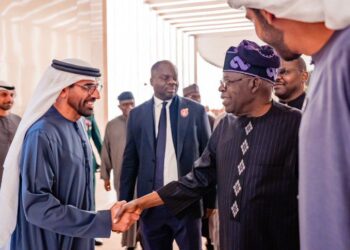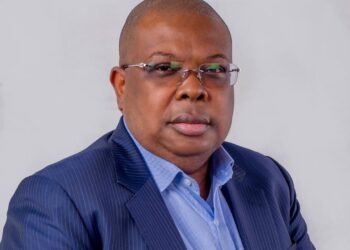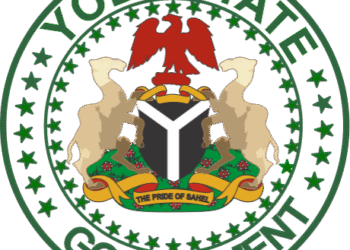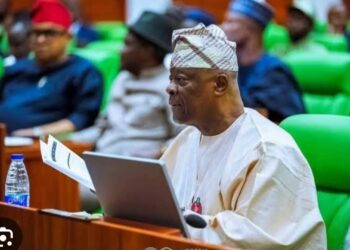By Emmanuel kehinde
Ilorin – The Secretary, Nigeria Peace and Security Forum (NPSF), Mr Salaudeen Hashim on Sunday, urged the Nigerian Ministry of Foreign Affairs; the Nigerian Ambassador in Liberia, Odudigbo Godfrey, and the secretariat overseeing the African Continental Free Trade Agreement (AFCFTA) to intervene over the alleged unfair treatment against a Nigerian company, INITS and its partners by some officials of government of Liberia.
INITS and its partners, EKEMP, a Chinese firm and Palm Insurance, a Liberian company, had made an acceptable presentation and defeated other bidders to supply and deliver biometric equipment, software, and materials for the 2023 voter registration exercise for Liberia.
The screening or bidding was conducted by the National Elections Commission (NEC) of Liberia.

After the screening, NEC adjudged INITS and its partners, to have successfully won the right to supply and deliver biometric equipment, software, and materials.
The electoral body consequently submitted a request for a “no objection” to Public Procurement and Concession Commission (PPCC) on August 30, seeking legal authorisation to grant the company and its partners the right to begin the procurement of biometric equipment for the 2023 general elections.
However, in a shocking move, the PPCC of Liberia rejected the award and called for a new presentation by all the bidders, including some who couldn’t successfully complete their demonstration before the evaluation committee.
But the NEC Chairperson, Davietta Brown Lansanah in a response letter to the PPCC on September 13; insisted that all procedures as mentioned in the bid document were followed and executed accordingly and that the procurement panel evaluated all bidders unbiasedly and selected INITS/EKEMP and its partners as the most responsive bidder.
Some people insinuated that the development suggested that there is a conspiracy theory to usurp the Nigeria Company and its partners in favour of another company that performed less during the presentation.
Hashim said the position of the PPCC is an unfair treatment of the Nigerian company and its partners.
He said, “The Nigerian envoy and other top Nigerian officials in Liberia, as well as the secretariat of the AfCFTA, should please address the matter and make sure Nigerians are not ill-treated.
“It is absolutely wrong. It is completely unacceptable and of course, it does not reflect the friendship Nigeria has always extended to Liberia as a fellow ECOWAS member. For a company that has actually submitted, successfully gone through an international bidding process and came out preferred, the directive of PPCC for a representation is suspected to be an effort to jeopardise INITS and her partners and give undue advantage to those other participants who did not fare well in the original presentation.
“What exactly is The African Continental Free Trade Agreement (AfCFTA) meant to achieve? African Continental Free Trade Agreement was brought to the table to be able to provide the absence of barriers and discrimination around services among signatories to the agreement.
“If this is happening, I think it is important AfCFTA secretariat is notified, and also approach the African Union and tell them that this is exactly what is happening. Almost every country on the continent has signed up for that agreement.
“So if that is the case, how much are we having this sort of selective discriminatory approach to the award of the contract?
“I find it very untidy. Nigeria played a very significant role in Liberia and how they have gone this far.”
The NEC Chairperson, Davietta Brown Lansanah insisted that the Nigerian company and its partners are the most responsive bidder.
Lansanah said: “As the PPCC is aware, the term ‘most responsive bidder’, on the basis of which the contract shall be awarded to the corresponding bidder, means the bidder with the best value for money considering technical specifications, delivery, etc., which are the benchmarks for the award of contract.
“With this in mind, the Procurement Committee reviewed the panel’s report, which includes the cards printed on the spot by three bidders during their representations before the panel. The Committee reviewed the submission of each bidder and found that the panel’s report had factual support and met the legal requirements. “The Procurement Committee endorsed the Panel’s report and on August 30, 2022, submitted the same to PPCC, requesting a ‘no objection’ to award the contract to the joint venture of EKEMP, Palm and INITS.
The NEC boss explained that the presentation of vendors was done physically before its bid evaluation panel, but there was no video taken and the panel did not request any power-point presentations.
According to Lansanah, NEC’s standard bidding document did not require any bidders to do a video recorded demonstration before the procurement evaluation panel and therefore there is no known basis to refuse the “no objection”.
The Public Procurement and Concession Commission (PPCC) while objecting to the request of NEC and rejecting the procurement right given to INITS and its partners, EKEMP and Spring Insurance on the following insinuations, excoriated the NEC for claiming that EKEMP and its joint venture partners met all of its bid requirements.
The PPCC Executive Director, Atty. Jargbe Roseline Nagbe Kowo, in a letter to the NEC on September 9 claimed that from the PPCC’s review of the NEC’s request, it observed that none of the electoral body’s bid evaluation panel in its entirety watched the bid demonstrations exercise, as there is no proof showing a full report of the demonstration process. However, the evaluation committee confirmed their personal appearance and individually signed the report of the committee sent to NEC procurement, video recording of the process has never been a requirement from PPCC except suddenly in this case.
According to her, as per the NEC’s submission to PPCC, a determining factor under the bidding process was the demonstration of the biometric process including the enrolment and de-duplication processes.
“The usability and functionality of biometric equipment and software were key factors for NEC’s evaluation, and also determining factors upon which some bidders were eliminated as per the [NEC] biometric evaluation panel report.”
Hashim warned that deliberate discrimination against Nigerian companies that desires to do legitimate business in Liberia may compromise the existing cordial diplomatic and trade relations between the two countries.
He recalled that Nigeria had in the past paid significant human, financial and material costs to secure the peace that Liberia enjoys today even when some other countries did not assist her.


















